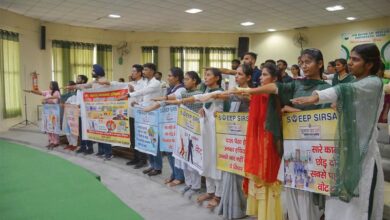Recovery of Drugs from Couple’s Shared Space Brings Both Into Liability: Delhi HC
Since the bail petitioner and her husband were both known drug users, the Delhi High Court recently concluded in a case that it was reasonable to believe that both knew about the contraband stored in their bedroom and were knowingly in possession of it. It also said that since the applicant’s husband’s office space was distinct, the obligation of any recovery from that area could not be attributed to the applicant’s wife.
“The office being a place where parties carry out their work and responsibilities where the upper floor was under the control of the Applicant’s husband shows that only Krunal Golwala had control and dominion of the premises from which the contraband was recovered,” Justice Jasmeet Singh said in granting the wife of the accused’s request for bail. Therefore, it cannot be said that the applicant was aware of having the illegal items found at the exclusive workplace of the co-accused and spouse, Krunal Golwala.
The case involves a drug cartel operating on the Telegram messaging service, in relation to which small, intermediate, and commercial amounts of drugs were seized from the applicant’s home and the husband’s workplace.
The court stated in regard to the recovery of marijuana from the applicant’s and her husband’s shared space, “Recovery of Ganja from the Bedroom may have been at the Applicant’s Husband’s Instigation, but the fact remains that it was recovered from the joint space of the Applicant and her Husband. Nowhere is it mentioned or contended that the applicant and her spouse were separated or that their relationship was tense. It would be incorrect to claim that the recovery of 1.03 kgs made from the bedroom cannot be attributed to the applicant since it was not made from a person but rather from a shared place.
According to the applicant’s attorney, the spouse was solely responsible for the recovery. The 1.03 kg of ganja found in the Golwalas’ shared house as contraband was, at best, a modest amount.
Regarding the information from the applicant’s phone, her attorney said that all talks were about “weed,” “hashish,” or chocolates derived from these substances, and their recovery was in tiny or medium quantities. As a result, the requirements of section 37 of the NDPS Act were not relevant. Another argument made was for parity with other people in comparable situations.
There is a clear presumption under sections 35 and 54 of the NDPS Act, 1985, against the applicant, as well as joint possession and established conspiracy against the parties, according to the Narcotics Control Bureau’s (NCB) attorney. The trial court correctly considered the facts on record and found that commercial quantities of contraband were recovered from Krunal Golwala’s home and workplace.
The court was hearing a bail plea for offenses under Sections 8(c), 20(b)(ii)(A), 20(b)(ii)(B), 21(b), 22(c), 23 and 29 of the Narcotic Drugs and Psychotropic Substances Act, 1985, including violating cannabis-related laws, recovering a commercial quantity of contraband, and illegally importing or transporting narcotic drugs.
The Supreme Court’s ruling in Jitendra Jain v. NCB, SLP (Crl.) 8900 of 2022 was cited by the HC.







